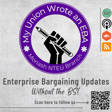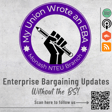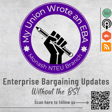
Episode 19 (actually this time): strike solidarity (w/Abigail & Thomas from UniMelb)
In this episode, - the first of two strike-related episodes that will drop this week - Kate & Tony bring everyone up to speed with what has been happening since the last episode, and then have a chat with Abigail & Thomas from Melbourne Uni about their first weeklong strike at the end of August and lessons they learned from it, as well as the branch-wide strike that is currently underway.
If you have questions you'd like answered, or any topics you would like to hear covered on the podcast, drop us an email at myunionwroteaneba@gmail.com
You can also stay up to date with everything happening with bargaining at our new bargaining website, and with the branch on Facebook and Twitter. All of which can be found here - https://linktr.ee/myunionwroteaneba


